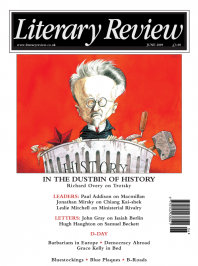Stephen Halliday
Buzz, Buzz, Buzz
Bugs and the Victorians
By J F M Clark
Yale University Press 341pp £25
This book’s title does not do justice to its contents since some of the most interesting material covers events that occurred either before Victoria came to the throne or long after she died. It describes the activities of Victorian entomologists but also introduces their eighteenth-century forebears, who set some (often misleading) ground rules for the science, and their twentieth-century successors who made practical use of their discoveries in the fields of agriculture and medicine. It also places interest in insects in a broader historical context, avoiding the danger of becoming a technical treatise.
Thus we learn that Henry Smeathman (1742–86), businessman, entomologist and philosopher, found that African termite mounds called to mind the constitutional settlement in 1689 after the Glorious Revolution. Termites had created an ordered hierarchy of ‘working insects, which I shall generally call labourers; next the fighting ones, or

Sign Up to our newsletter
Receive free articles, highlights from the archive, news, details of prizes, and much more.@Lit_Review
Follow Literary Review on Twitter
Twitter Feed
Alfred, Lord Tennyson is practically a byword for old-fashioned Victorian grandeur, rarely pictured without a cravat and a serious beard.
Seamus Perry tries to picture him as a younger man.
Seamus Perry - Before the Beard
Seamus Perry: Before the Beard - The Boundless Deep: Young Tennyson, Science, and the Crisis of Belief by Richard Holmes
literaryreview.co.uk
Novelist Muriel Spark had a tongue that could produce both sugar and poison. It’s no surprise, then, that her letters make for a brilliant read.
@claire_harman considers some of the most entertaining.
Claire Harman - Fighting Words
Claire Harman: Fighting Words - The Letters of Muriel Spark, Volume 1: 1944-1963 by Dan Gunn
literaryreview.co.uk
Of all the articles I’ve published in recent years, this is *by far* my favourite.
✍️ On childhood, memory, and the sea - for @Lit_Review :
https://literaryreview.co.uk/flotsam-and-jetsam